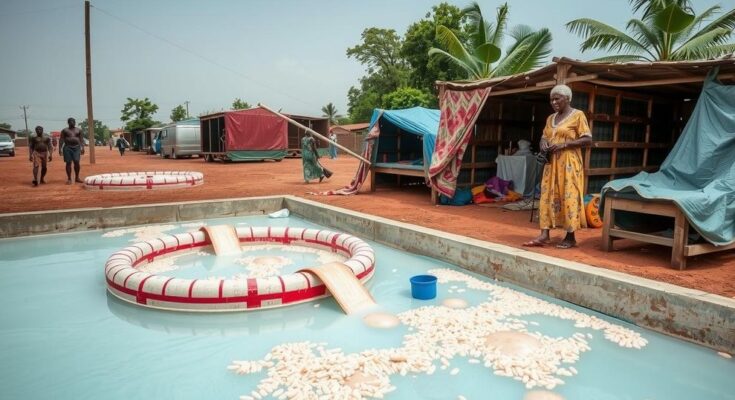A cholera outbreak in South Sudan has claimed nearly 60 lives since October 28, with over 6,000 cases reported. The outbreak is particularly severe in IDP camps and refugee areas. Vaccination efforts are underway, and the Ministry of Health is advocating for improved hygiene practices among residents. Vulnerable populations face heightened risk amidst poor living conditions.
A cholera outbreak in South Sudan has tragically resulted in nearly 60 fatalities since its emergence on October 28, as reported by Michael Makuei Lueth, the Minister of Information and Communication. In response to the alarming situation, government and UN agencies have initiated vaccination efforts after noting 2,184 cases and 31 initial deaths. “Cholera is available nowadays in South Sudan. It has started again, but it is now spreading all over, and up to now, we have lost about 60 people and recorded about 6,000 cases of cholera,” stated Lueth.
The outbreak is particularly prevalent in internally displaced person (IDP) camps located in the capital Juba, as well as regions such as Rubkona County in Unity State and Aweil in Northern Bahr el Ghazal. Refugee camps in northern South Sudan, specifically in Renk, are also hard-hit, with refugees fleeing from Sudan being disproportionately affected. Lueth emphasized the Ministry of Health’s urgent request for additional vaccines to address this pressing public health crisis. He stated, “Efforts are underway to get more vaccines for the other areas. However, the message of the Minister of Health is, keep your house clean and don’t drink or eat cold food; you must eat warm food. This is the best protection against cholera.”
A collaborative statement from the South Sudan Ministry of Health and UN agencies highlighted that the cholera outbreak is significantly affecting refugees, returnees, and locals alike. Vulnerable populations, especially children under five and the elderly, face heightened risks due to dense living conditions in transit centers and camps, paired with limited access to clean water and inadequate sanitation practices. The initial cases were traced back to an ongoing outbreak in neighboring Sudan, which has already impacted over 40,000 individuals. Since April 2023, over 880,000 people have fled Sudan, with many entering South Sudan via Renk County, where the UN is facilitating essential services for incoming refugees.
Cholera is an acute diarrheal disease caused by the ingestion of water or food contaminated with the bacterium Vibrio cholerae. It can lead to severe dehydration and death if untreated. South Sudan has faced recurrent cholera outbreaks since its independence in 2011, exacerbated by ongoing conflict, displacement, and a lack of infrastructure. The current outbreak is linked to the broader humanitarian crisis resulting from the conflict in Sudan, which has displaced large populations seeking refuge in South Sudan, thus straining the already limited health services and sanitation facilities.
In summary, the cholera outbreak in South Sudan is a critical public health emergency, with nearly 60 deaths and over 6,000 reported cases thus far. The government and UN agencies are mobilizing vaccination campaigns and health education efforts to mitigate the spread. Affected populations, including refugees and internally displaced persons, face a precarious situation, especially in regions with inadequate sanitation and hygiene practices. Enhanced efforts are essential for controlling the outbreak and safeguarding vulnerable communities.
Original Source: news.az




